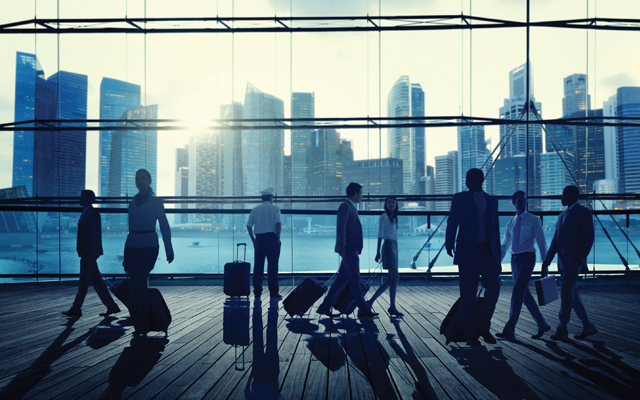Health and safety concerns are holding most Asian companies and employees back from resuming business travel, discovers Caroline Boey, but new border reopenings are triggering movement.
Asian corporate travel managers (CTM) are cautiously optimistic about 2022, but reiterate international business trips will continue to be restricted despite higher rates of Covid-19 vaccination and the loosening of lockdown measures in some countries.
At press time, they shared that top reasons for the outlook was based on closed borders, quarantine measures that could require travellers to be away from home for up to a month in some instances, and onerous visa and paperwork requirements.

A matter of demand
While most CTMs said that travel budgets were not being cut, one Singapore-based CTM said his 2022 travel budget was “relatively flat” and noted that compared to the past, “allocation and investment were being directed towards new product launches”.
He said: “There was a lot less travel in 2021 than budgeted, and our approach for 2022 is on the expectation that teams are planning for full activity levels, but factoring in quarterly revisions.”
The best-case scenario, he noted, would be more borders reopening and no quarantine for business travellers as Covid-19 vaccination rates continue to climb.
He continued: “More than half of our employees are willing to travel and insurance policies now includes Covid-19 coverage. But it is ultimately up to the employee to decide if he is willing or not to go on a business trip.
“Yes, people want to shake hands and there is a lot of pent-up (travel) demand for sure. But the new breed of traveller – and there is a larger group of them – will travel only when it is really necessary, are conscious of Covid-19, and will think twice because of a growing awareness about sustainability.”
Still, questions about overseas incentive trips are being asked to motivate sales teams and drive revenue, he said, adding that those who will be generating travel demand are in regional and global roles.
In the case of an IT company based in India, its CTM said there was no fixed budget and expected travel spend to be flat next year.
He explained: “I foresee travellers still hesitating to travel and organisations nervous about sending people out in 2022. So, the biggest challenge will be overcoming these psychological issues.
“Overall trip cost will increase due to border restrictions, quarantine requirements, vaccinations, PCR tests, etc, and this will result in a smaller number of trips based on the same budget.”
Travel outlook is more bleak for a global telecommunications company. Its Hong Kong-based regional travel manager revealed that staff would continue to “be under full travel restrictions” at least until early-2022.
Adriana Nainggolan, Autodesk’s travel programme manager, Asia-Pacific, told TTGmice that it was still a “wait-and-see situation” and international travel had not fully started yet for staff.
Nainggolan continued: “But if someone needs to travel internationally, and generally it is for customer engagement, vice president approval is required. It’s not so much about cost, but the approval to travel as a restriction is still in place.
“Our 2022 travel programme remains the same and still refers to our Covid-19 travel guidelines.”
While one Singapore-based pharmaceutical company has reopened its online booking tool in mid-July, its CTM, who attended a recent virtual buyer forum, told TTGmice that less than half of attendees polled had done likewise.
Domestic travel comes first
Commenting on regions that have resumed corporate travel, Nainggolan pointed out that domestic travel in China and the US had resumed, followed by Australia but this was subjected to regional lockdowns.
Challenges for Nainggolan were still safety and security in conjunction with country restrictions on vaccinations, quarantine resulting in travel bubbles that keep on changing, and how much the TMC would be able to support in these areas.
Expressing some optimism, Benson Tang, executive director, corporate travel, Informa Markets, believed 2022 would be a better year, also referencing his outlook on the resumption of domestic business trips in China, the US and intra-regional Europe.
But compared to pre-Covid, Tang noted travel levels next year would still be significantly lower as most international borders were still closed, that only around 30 per cent of the global population have been vaccinated, and new virus variants such as Delta Plus and Mu had emerged.
For Peter Koh, Asia strategic sourcing manager, travel and professional services, Corning, “predicting when international business travel can resume” has stopped.
Koh noted: “It boils down to when borders reopen, so planning an in-person meeting is difficult. However, we can and should be prepared.”
Koh revealed that his company’s 2019/2020 budget was unused, and half of the unutilised 2021 budget would be carried forward into 2022.
He continued: “With what we are seeing with the more contagious Delta variant and the emergence of new strains, the outlook is not very positive. But we can look forward to the end of 2022 and the industry going back to normal in 2023.”
Optimism on the horizon
Following the bulk of interviews completed in September, several Asian governments made much-welcomed announcements to resume travel for fully vaccinated travellers.
Singapore announced 11 quarantine-free Vaccinated Travel Lanes with various countries, two of which – Brunei and Germany – were in force at press time. The others to come include South Korea, Canada and France.
The Vaccinated Travel Lane with Germany has been well received by city-state-based business travellers, who used German cities as a central meeting point with business partners and colleagues from across Europe and the US, according to FCM’s Vicki Parris, vice president for customer success in Asia.
Malaysia restarted interstate travel on October 11, while Indonesia aims to reopen Bali and the Riau Islands to foreign visitors from select countries in late-October, with on-arrival quarantine shortened from eight to five days.
Thailand is working towards unrestricted entry for air travellers from at least 10 low-risk countries, including Singapore, from November 1. – Additional reporting by Karen Yue





















